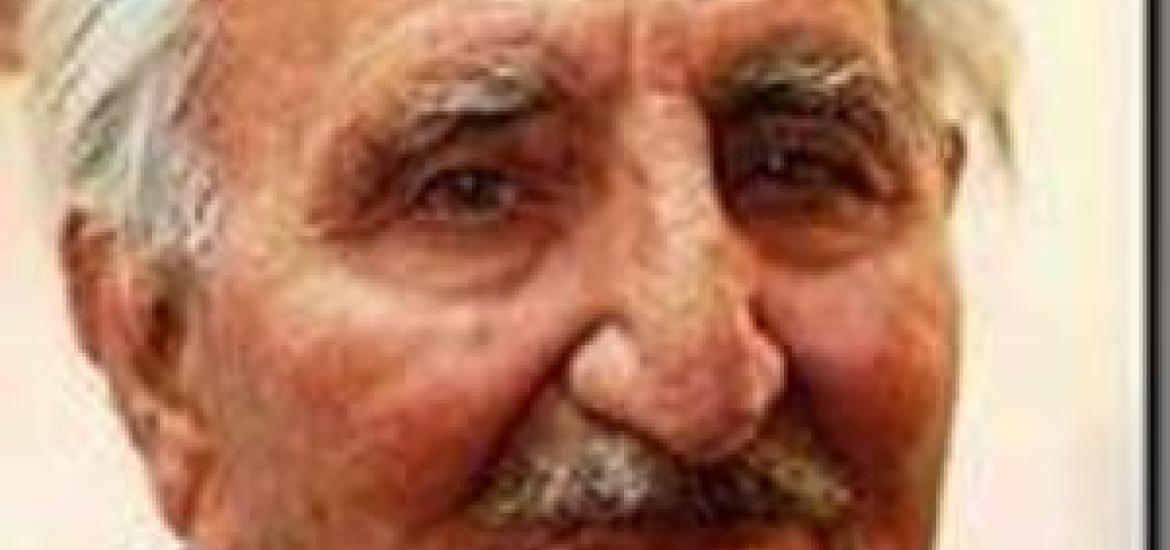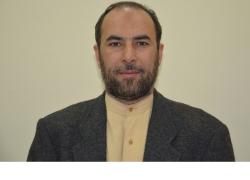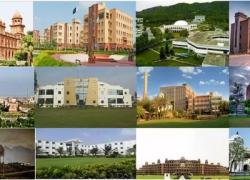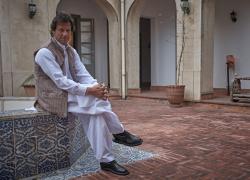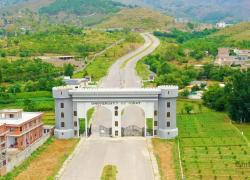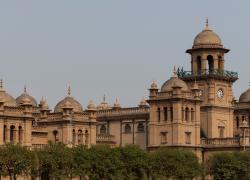GHANI KHAN: AS I KNOW HIM
I feel honored to have the privilege to meet Ghani Khan, for the first time, when I was a student at the Government College Lahore. During my summer vacations, I visited his residence, placed in a remote village Muhammad Nari in Charsadda. Sitting in a wheelchair, he warmly welcomed me. I remained with him for half an hour. I had the curiosity to learn about different aspects of his life, dig deeper into his personality, literary work, ideas and philosophy.
During the course of my meeting, a number of areas came up under discussion. He elucidated many things at length, shared his personal account on several issues and talked about a broad a range of topics. I had a wonderful time in his company. After this maiden visit, I had the chance to have several settings with him and this is how I germinated a deep understanding of his life, personality, work, ideas, philosophy and contribution which I want to share with the readers. One important theme, I extracted from my panoptic interaction with him is that he wanted to see the Pashtun nation to get educated and become enlightened having a vision with a strong sense of justice so that they can define their own destiny.
Not merely a poetic genius
Ghani Khani was a dynamic personality featuring diversity in many aspects. He was a simple, straightforward person, but in fact, he was a kind of person very difficult to comprehend, a ‘complicated simplicity’, in his own right. By and large, he was famous for his poetic genius. But in fact, he was not merely a poet but an eminent intellectual, writer, journalist, critic, philosopher, politician, engineer, statesman, legislator, sculptor, painter, theologian, historian, statesman, mystic, humanist and a great artist.
Personality
Ghani Khan was a tall, handsome person with striking features, silky long hair, strong hawkish nose, bristly eyebrows, deep voice, strong physique, dark greenish eyes that remained off and on closed or half closed during his conversation. He used to talk slowly in a highly informal manner taking several pauses with breaks and gaps, in the middle, during his daily conversation. Nevertheless, he spoke his mind with immense comfort and exceptional confidence. He was a very generous, cordial and welcoming person by nature. He loved to meet everyone who visited him. He was widely known for his generosity and always shared, whatever he had, with the people. He had a wonderful life, full of joy, pain, emotions and excitement with no discernible regrets, altogether.
Early life
Ghani Khan belonged to a Khan family of Charsadda which remained involved in local, regional and international politics for quite a long time. He was born in January 1914 in Utmanzai a small town in Charsadda. He was the eldest son of Abdul Ghaffar Khan alias Bacha Khan a prominent land-owner of the Mohammadzai tribe, widely known for his relentless, non-violent struggle against British rule in India. He was the elder brother of Abdul Wali Khan, an eminent nationalist leader. His mother, Meharqanda, was a daughter of Yar Mohammad Khan of the Mohammadzai tribe. His mother passed away when he was barely five. After his mother’s sad demise, he was looked after by his paternal grandmother who also died in 1923. Since his father spent a significant amount of time away from home in connection with the freedom movement, his early life was lived in serious hardships, untold miseries, agonies and adversities.
Education
His father, originally, contrived to make him a religious scholar for the overwhelming influence of the clergymen in the Pashtun society. He received his early education from a religious teacher in his hometown. He also studied at the Azad High School, Utmanzai founded by his father, where he learned the Holy Quran and studied scores of religious books. He went to the Jamia Milli, Delhi, a renowned Muslim religious institution in India. Later on, his father changed his mind altogether and decided that Ghani should receive western education and was consequently sent to England where he remained with and tutored by a renowned clergyman for almost two and a half years, to get the feeling of the Christian missionary zeal, passion and obsession in serving humanity, to have a deeper insight into the ways of English life and most importantly to find the reasons for the English global dominance, glory and supremacy. Not gratified with his stay in England, his father finally concurred to send him to the US to study Chemical Engineering at the University of Southern Louisiana.
Upon incarceration of his father for civil disobedience and confiscation of their property, he returned from the US without completing his formal education owing to serious financial constraints. Later on, he carried on his studies at the Shantiniketan Academy, a school of Art established by Rabindranath Tagore, an eminent Indian literary figure, poet and philosopher. There he developed a peculiar penchant for sculpture and painting. Construing liberal coeducational ambiance of the institute as disastrous and the field of his son’s interest for academic pursuits believing to be of little relevance to the ongoing freedom struggle against British Rule, his father decided to take him out of the institute and hence, very unfortunately, his formal education left incomplete, once again.
Poetry
Ghani Khan is, generally, regarded as was one of the eminent Pashto poets of the 20th Century. Being a poet of love and beauty, widely believed to be not understood, in its true essence by the general masses. Nevertheless, he received so much admiration in his lifetime, no other poet can even think of. He became a legend in his own era and everyone would certainly testify to the fact. He was all the rage among the youth, especially, the university students. During the last couple of years of his life, he touched the heights of popularity and was admired by people of all ages. Credit for the same partly goes to the renowned Pashto signer Sardar Ali Takkar who played an instrumental role in presenting the poetry of legendary Ghani Khan to the general public in a variety of ways and in different styles and the people admired Takkar for singing poetry of Khan with great passion.
While talking about the poetry of Ghani Khan, it features numerous colours and a variety of shades. It bears the nationalism of Khushal, the mysticism of Rehman, skepticism of Khyyam, aestheticism of Keats and romanticism of Shelley all mixed together with a freedom of thought and richness of imagination. The themes, he chose for his poetry, included but not limited to nature, life and death, love and beauty, fate, personalities, nationalism and freedom, religion and belief in God, insects, birds, animals, trees and flowers. However, a great deal of his work comprises of a blatant satire on the clergymen. His lyricism is deep, his thoughts philosophical and his tone rebellious. In his poetry he identified himself as a ‘mad philosopher’ but in fact, his ‘madness’ was a symbol of wisdom and enlightenment.
In Urdu poetry, Khan highly extolled Allam Iqbal and some of the translations of Iqbal’s poems were made part of his book- ‘Da Ghani Kulyat’. He spoke highly of Asadullah Khan Ghalib. In the contemporary Pashto poets, he had an utmost predilection for the poetry of Rehmat Shah Sail and Ikramullah Gran. About Khalil Jibran, he said, “Khalil Jibran inspired me a lot” further adding that “Khalil Jibran produced not only quality poetry but also some fabulous paintings”.
Prose writing
Apart from poetry, Ghani Khan was, essentially, an eminent prose writer. During the course of his long literary career, he wrote extensively on a variety of subjects. As a prose writer, his book titled ‘The Pathans’, published in the English language in 1947 is a fantastic work from a legendary figure about the life, history, culture, norms, values, principles, codes, customs and traditions of the Pashtun nation. Another of his book ـ ‘Khan Sahib’ appeared in 1994 is basically his sole publication in the Urdu language, imbibing views of a simple and naïve Pashtun, on a variety of subjects characterized by wisdom, humour and satire. Besides, he also wrote articles on different themes in the English language for various publishing houses and were translated into many other languages.
Love for books and his pastime
Ghani Khan had a personal library at his residence. Books on a variety of subjects are available here. He was fond of reading all kinds of books. In the latter part of his life, he used to read novels. He loved to read story books for the amusement of his grandchildren. He used to read books even when he was on the deathbed. Gardening was his pastime. He loved to grow all kinds of flower plants, all over his garden. Red roses and the spring season were his favorite. Besides human beings, he was having deep insight into a broad range of animals and reared dogs and horses in his youth. He enjoyed watching cricket and football on TV. He used to play boating while he was in England. After living a life, full of events, ups and downs, joy and sorrow and tranquility and commotion, this legendary literary figure died in March 1996 after a protracted illness. May Allah (SWT) rest his soul in eternal peace and grant him the highest place in Jannah.
This blog post is an extended version of my newspaper article published in the English daily, the Frontier Post during my student life.

